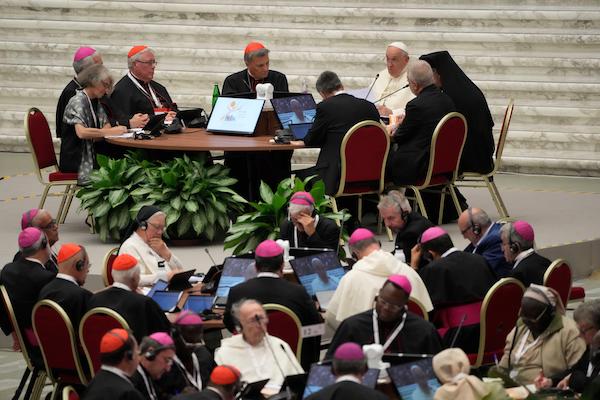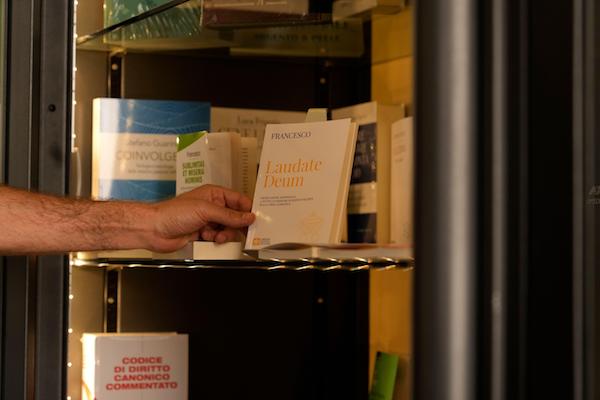Pope Francis has published an apostolic exhortation to follow his 2015 encyclical on the environment Laudato si‘, sharply criticising climate-change denial and the failure of international politics to respond effectively to the crisis – despite it being “a global social issue and one intimately related to the dignity of human life”.
Laudate Deum draws its title from what the Pope said was the lifelong message of St Francis of Assisi, on whose feast day it was released: “Praise God for all his creatures.”
The Bishop of Salford John Arnold, who speaks on the environment for the bishops of England and Wales, praised the exhortation as “timely and prophetic”.
Christine Allen, the director of Cafod, that it “reminds us [that] human beings and the earth are not replaceable commodities”.
Pope Francis writes that since 2015, responses to the climate crisis “have not been adequate, while the world in which we live is collapsing”. The new exhortation is therefore “to clarify and complete what we were able to state” in Laudato si’.
“It is no longer possible to doubt the human – ‘anthropic’ – origin of climate change,” Francis writes, emphasising that “it is verifiable that specific climate changes provoked by humanity are notably heightening the probability of extreme phenomena”, as recognised by an “overwhelming majority of scientists specialising in the climate”.
He continues: “I feel obliged to make these clarifications, which may appear obvious, because of certain dismissive and scarcely recognisable opinions that I encounter, even within the Catholic Church.”
The climate crisis, he says, “is not exactly a matter that interests the great economic powers”, who blame rising populations in low-income countries: “As usual, it would seem that everything is the fault of the poor.”
He posits lasting damage to the oceans as “one of the many signs that the other creatures of this world have stopped being our companions along the way and have become instead our victims”, feeding the “technocratic paradigm” which he described in Laudato si’.
“Everything that exists ceases to be a gift for which we should be thankful, esteem and cherish, and instead becomes a slave, prey to any whim of the human mind and its capacities.”
Francis cites the idea of the nineteenth-century Russian philosopher and theologian Vladimir Solovyov, who conceived of “an age so advanced as to be actually the last one”.
Pursuing this theme, he warns against a mistaken notion of meritocracy “seen as a ‘merited’ human power to which everything must be submitted”, fostering the “ethical decadence of real power”.
Laudate Deum includes a substantial critique of the “weakness of international politics”, which the Pope argues is in thrall to false ideas of power and interest.
He calls for “a multilateralism that is not dependent on changing political conditions or the interests of a certain few, and possesses a stable efficacy”, to respond to “the new world situation” in which “old multilateralism” is ineffective.
The Ottawa Process – where an international ban on anti-personnel mines was negotiated outside an official UN forum – “shows how civil society with its organisations is capable of creating effective dynamics that the United Nations cannot”, Francis writes.
Effective action requires “recognising that the emerging forces are becoming increasingly relevant and are in fact capable of obtaining important results in the resolution of concrete problems” and so demands “a new procedure for decision-making and legitimising those decisions”.
By contrast, he recounts the history of the UN’s Conference of Parties (COP) meetings since 1992 and their progress and disappointments, noting that even where there are significant agreements such as at COP21 in Paris in 2015 “there are no provisions for sanctions in the case of unfulfilled commitments, nor effective instruments to ensure their fulfilment”.
Looking to COP28 in Dubai this December, he says: “The conference can represent a change of direction, showing that everything done since 1992 was in fact serious and worth the effort, or else it will be a great disappointment and jeopardise whatever good has been achieved thus far.”
Its decisions must be “drastic, intense and count on the commitment of all” and those taking part “demonstrate the nobility of politics and not its shame”.
Francis acknowledges that “the most effective solutions will not come from individual efforts alone, but above all from major political decisions”. He emphasises, however, “that there are no lasting changes without cultural changes, without a maturing of lifestyles and convictions within societies, and there are no cultural changes without personal changes”.
Reminding Catholics of “the motivations born of their faith”, he says that they must escape “the technocratic paradigm [which] can isolate us from the world that surrounds us”.
“The Judaeo-Christian vision of the cosmos defends the unique and central value of the human being amid the marvellous concert of all God’s creatures, but today we see ourselves forced to realise that it is only possible to sustain a ‘situated anthropocentrism’.
“To recognise, in other words, that human life is incomprehensible and unsustainable without other creatures.”
He says that personal and community habits are key to “transformation rising deep from within society”, citing per capita emissions in the United States – twice those of China and seven times the average in the poorest countries – as evidence of the need for “a broad change in the irresponsible lifestyle connected with the Western model”.
Cafod praised Laudate Deum for recognising “the reality of the climate crisis” and the responsibility of the richest countries to act.
“We are interdependent and connected,” said Christine Allen. “Yet we continue to put greed over and above our love for each other or for our planet.”
She said that “politicians in wealthy countries must lead the way: facing up to our historic responsibility as a major polluter, and providing more financial and technical support for communities to respond to the effects of climate change.”
Cardinal Vincent Nichols also voiced his support for “the Pope’s heartfelt appeal to all people of good will, to communities, business, governments and international bodies that each play a part in facing and responding to the challenges of climate change”.
“Faith in God as creator and giver of all good gifts is foundational,” he said.



 Loading ...
Loading ...